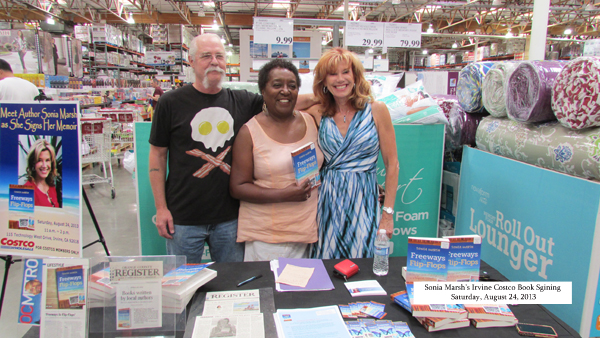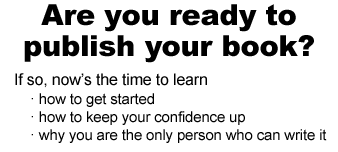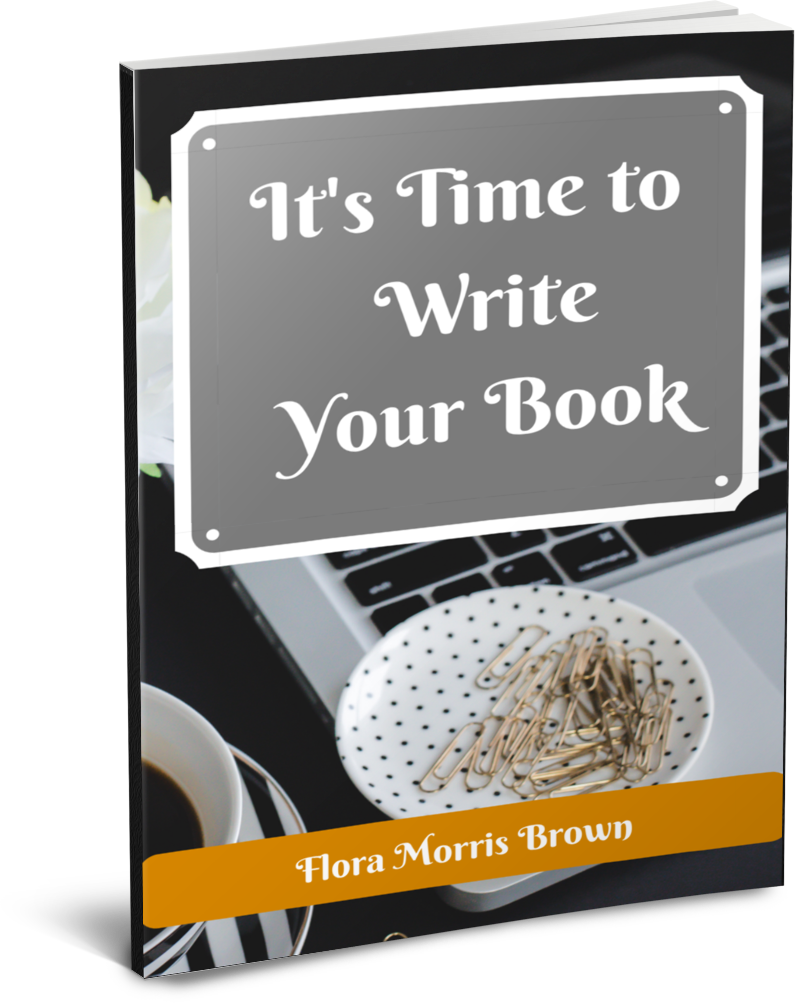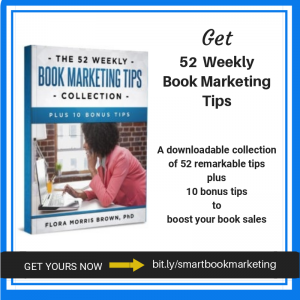Today’s post is being shared with the permission of A. Michelle Blakeley, Micro Business Therapist™. Learn more about her below the post.

Author Sonia Marsh on the right greets shoppers who stop by her table at Costco. I’m holding up a copy of her book, From Freeways to Flip Flops, just before she signs it. To learn how to get your book in Costco, visit http://SoniaMarsh.com
There’s an unspoken rule that when you are asked to speak at an event, you have something tangible to provide or sell in the back of the room. It’s marketing 101 for speakers. Writing a book is easier than people may think (stay tuned for that article). However, marketing and selling a book is where the challenge lies and is far more difficult. You have to engage your audience, in advance, and build up anticipation. You have to give them good reason to part with their hard earned money, just like you would for your other product or services. What are they going to get out of your book? That’s what you need to focus on when you are marketing and selling your book.
I was asked to speak at an event in Portland. It was three weeks away. I had no book. So, I wrote one. The cart came before the horse and I had no time to market my book in advance. When life gives you lemons, you make lemonade. The speaking event is over and now I have a book to market and 35 entrepreneurs and writers were kind enough to share their thoughts on successful book marketing tactics. Although I wasn’t able to build up anticipation and market my book six months in advance, I certainly plan on taking advantage of more than a few of the sage and practical tips below.
Get an ISBN#. Anyway, I have an e-book called Cold Calling for the Clueless and I did all the typical steps, hiring an editor, hiring a cover designer and formatter but, the step that I did which I don’t think a lot of folks do is get an ISBN number. Amazon won’t sell a book without it. At the time I paid the $75 and it was so worthwhile as I now sell it on Amazon and BN.com. Ceri, www.itsyourcall.com
Create a postcard. Design postcards and have them with you at all times…in your purse or car. Hand them out or put them on Community Bulletin boards. They’re an inexpensive way to promote yourself to the general public. Jennifer Vanderslice, www.MoonGlowPR.com
Participate in local author groups. Network, network, network! Attend events where you know you can meet local media people. Every time you go out in public, it’s an opportunity to promote your book. Jennifer Vanderslice, www.MoonGlowPR.com
Use the right keywords. Understand the power of Keywords in your book descriptions. Reading your on-line reader reviews can provide useful insights; for example, one very favorable reviewer said she always searched for books about medieval life, so those two words went right into my Keywords. Octavia Randolph, www.OctaviaRandolph.com
Create series. Write more than one book, preferably a series concerning the same subject or characters. Once you have your first truly good book, write a second, and a third. There is great synergy between titles. Octavia Randolph, www.OctaviaRandolph.com
Build your crowd first. One tip that I would share with authors considering self-publishing is to build their audience before releasing the book. Have a blog, use social media, start a podcast, do interviews, guest blog posts, whatever it takes to build an email list of engaged audience members. Ryan Hanley, www.ryanhanley.com
Check local spots for speaking opportunities. Many places often look for speakers, including libraries and local bookstores. Sometimes Cultural Councils will provide grants to do historical talks related to your books. Also, several of my historical novels have led me to begin working on non-fiction books as well. Carla Charter
Be sure to write a good book! Even if the book is free, readers still expect the writer to produce a quality work, with a proper cover, appropriate formatting and a mistake-free text. If you can provide them with a pleasant experience, they just may buy more or the rest of the series. Martin Rouillard, www.martinrouillard.com
Use the end as the beginning. Once you captivated your reader and succeeded in bringing them all the way to the end of the story, why not capitalize on this work with a few pages aimed at bringing the reader to your other books. I always include the first chapter of the next book in the series, as well as high-resolution cover image and links to buy the book. It’s also a great place to put a compelling author’s bio and any other marketing ideas an author may have. For example, I recently ran a contest where if readers sent me a link to a review they left with online retailers, they became eligible to win an exclusive print edition of all three books, available only through this offer. The result was many good reviews on Amazon, iTunes and other retailer’s websites, for a relatively minimal cost. Martin Rouillard, www.martinrouillard.com
Set the table. Have your online presence in place and secure BEFORE publishing. I thought I did and then, when I got on TV my website couldn’t handle the traffic (which I was promised it could by the host). This was before social media, so also secure those now also. Carolyn Wilman, www.contestqueen.com
Be the expert. Establish yourself as an expert in the field. I have with many media outlets and now they call me when they are writing an article on winning, luck, sweepstakes, etc. Carolyn Wilman, www.contestqueen.com
Refine your niche. My books are baby books, but dedicated to cognitive development (that is my niche). Sophie Helenek, www.nurserybooks.net
Proper link management. Amazon now has 14 storefronts around the world (with 11 storefront-specific affiliate programs). If you are an author with an international following you need to make sure your marketing links are sending your readers from around the world to the place they’re able to purchase your books. BookLinker was created specifically for independent authors, small book publishers, and bloggers marketing books to a global audience via branded short URLs and basic reporting. With awesome short URLs like “mybook.to” and “viewauthor.at,” your readers will know exactly what they’re getting into, and will be able to purchase or download your book from their local Amazon storefronts. This means no more error messages or bad purchasing experiences from ending up in a store where they don’t know the language, or don’t have an account to make the purchase. Jesse Lakes, GeoRiot.com
First impressions still matter. Ensure all of your marketing materials are polished and über professional. Because of the perception that self-published books may not be first-rate, I invested time and money to make sure all of my marketing materials—from my speaker’s kit and press releases to my business card, website, and workshop flyers —were just as good, if not better, than those created by large publishing houses. The quality of my materials sends the message that I have a quality book, which I do! Chaz Pitts-Kyser, www.thebook.careeranista.com
Do your research. Find out the pros/cons to self-publishing vs. traditional. It requires a lot of work and you definitely want to know and understand all that it truly entails. The traditional way of publishing a book through a large publishing house allows you to put the majority of your focus on writing your manuscript versus wearing the multiple hats of writer, publisher, marketer etc. Patrice Tartt, www.PatriceTartt.com
Exploit current events. My number one tip is to tie your book into a recent event that was in the news. I realized early on that producers want you on their show to either entertain or inform – they don’t want you to just talk about your book. When the economy took a nosedive a few years ago, I was able to show how my family lived off my teacher’s salary. www.dannykofke.blogspot.com
Don’t give up. My second tip is to keep pitching. Some producers receive over 1,000 emails a day! Just because you don’t get a response doesn’t mean they are not interested. They may have just over-looked it. Keep pitching! Danny Kofke, www.dannykofke.blogspot.com
Enlist your current supporters. I offered my list a chance to read the book for free if they offered a review. One-third of the list responded. My book won’t be released until April 15, so I won’t know how many of them will make good on that commitment until then, but the feedback I’ve received so far tells me that most of them will follow through I’ve had some tell me they’ve already written their reviews and saved them for easy upload later. On the launch date, I should have a good number of reviews and perhaps even some early pre-orders that will drive the book to greater popularity. Allen Taylor, tayloredcontent.com
Toot your own horn. Submit your book for awards. Our books have won three awards, which gives you lots of credibility. Lisa Cohn, www.bashandlucy.com
Consistency. Only blog if you can do it regularly. An unmaintained blog on an author’s site looks much worse than no blog at all. The same goes for social media – pick one or two channels that you’ll actually use and concentrate on those. There’s no point in having a Twitter link on your site to a Twitter account you never update. You probably only get one or two clicks from most users on your site. Don’t waste them on that. Ian Rose, quarterreads.com
Share the wealth. Be willing to give away books – don’t be stingy! Influence the Influencers. We brainstormed all the people who influenced our ideal reader. Whether it was someone with a sales podcast or a Vice President of Sales, they all influenced our readers who are salespeople and business owners. So, we got their mailing address and sent them an autographed copy of our book. We knew if this person liked it, they would talk about it and share it with the group that they influence and it worked. If you want to sell books as an independent author/publisher you must be willing to give some away. Andrea Waltz, www.goforno.com
Maximize social media. A lot of times as self-published authors, one feels as if all you have to do is a website, Facebook, twitter, Instagram representing the book and that is it. While yes, it is important to have all of those networks under your belt, you have to ensure that you are engaging your followers, obtaining more followers outside of your family/friends, and making sure you stay mindful for your followers that are in totally different time zone than you. Use sites like socialoomph.com, justunfollow.com, and or hootsuite.com. They allow you to strategically gain followers and schedule post to out automatically on several different social networks at a time. Ni’cola Mitchell, www.nicolacmitchell.com
Speak on it. Conduct keynote addresses and sell the books with the address there is nothing better than having 1000 people walk around with copies of your book. Drew Stevens Ph.D., stevensconsultinggroup.com
Switchback. Write articles and blog posts and tie them back to your book website so that people click on the link and buy. Drew Stevens Ph.D., stevensconsultinggroup.com
Lend me your ear. Audio books are all the rage because…they are all the rage. Look at all the people with headphones on riding BART to work. Do you think they are all listening to rap? In addition, the Audible.com contract is extremely favorable to authors who narrate their own books. Scott Hammond, PhD
Get creative. Last February, I promoted my Figure Skating Mystery series by partnering with Olympic Gold medalist Dick Button. I produced his live Figure Skating Twitter coverage, and I promoted my books during the commercial breaks. Sales went up 400% and the books were Amazon best-sellers. Alina Adams, www.AlinaAdams.com
Can you write in front of an audience? I am promoting my romance novels by writing my next romance novel live at www.AlinaAdams.com/live and taking reader feedback on where the story should go next. Again, no one else is doing anything like it, which gives me a promotional hook. Alina Adams, www.AlinaAdams.com
Be prolific. Whether in fiction or non-fiction, one good book just doesn’t cut it to build an audience (unless you’ve gained personal notoriety outside of writing). Fan bases start expanding after an author’s fourth book. Courtney Pierce, www.courtney-pierce.com
Use a tip sheet. Write and distribute a specific type of press release called a tip sheet to the media and bloggers. A tip sheet is a press release that offers tips or advice in a bulleted or numbered format. Media outlets love them, but they can be used in many other ways, too. Sandra Beckwith, www.buildbookbuzz.com
Check out podcasts. I haven’t self-published, but I have worked with several authors that have. One strategy that they used to promote their book was to go to the Tune In Radio website and find radio shows that fit the genre/topic of their book. They then reached out to the hosts of each show and got booked on many of them to talk. They were considered an expert on the topic since they wrote a book on it. Getting on radio shows or podcasts in this way can really be good for publicity. Nihar Suthar, www.niharsuthar.com
Create a book trailer. I had a book-trailer made – it was simple to make, didn’t cost me anything, and won me an eLit award, plus enough attention that my book is being considered for the big screen (it helps that my daughter is an editor, so she put the finishing touches on the trailer). Niki Smart, www.nikismart.com
Shop gifting? I’ve also had the guerrilla marketing idea to sneak into the larger bookstores and place a copy of my memoir Hell Camp on all the best sellers display shelves – it’s not shop lifting, it’s shop gifting. Not sure how much trouble one would get into for doing that, and I haven’t had the nerve to do it… yet! 🙂 Niki Smart, www.nikismart.com
Exploit large affiliates. It is important to link up with a larger affiliate so that when there is an event, you can contribute in some way and therefore ‘tailgate’ onto the larger database and marketing of the larger affiliate. An example of this would be participating in a national on line event (such as World Tai Chi Day, for example) and offering to give a PDF of your book away, then responding to each request with a link to purchase the book on Amazon. Khadi Madama, www.yourstrulyprandmedia.com
Facebook launch. Doing Facebook book launches where you simply give away PDF copies of the book in exchange for the people LIKING your page and putting the book on their WISH LIST at Amazon. Khadi Madama, www.yourstrulyprandmedia.com
Do a Twitter Chat. Be a guest or host a Twitter chat to discuss the highlights and premise of your book. Cheval John, www.vallanomedia.com
Selling foreign rights. Being able to say Translated into 24 languages by publishers in Europe, Asia and Latin America, gave my book a lot of credibility for getting media interviews — more than 180 radio, television and print interviews so far — which is key to increasing sales. To find agents, Google foreign rights agents. Lists of publishers’ foreign rights agents will come up. Email these agents an exciting pitch with links to reviews and media interviews and see if they’ll represent your book to publishers in their market. Selling foreign rights for your book helps sell your book at home. It not only helps you change the world by sharing your book’s insights to readers in other countries, it gives your book that extra credibility that can lead to a lot of media interviews and speaking engagements. Elliott Katz, www.awardpress.com
Turn your book into a workshop. Offer to conduct workshops surrounding topics in your book. There are a variety of venues where you can share insights on your book. Women’s conferences, book clubs, Chamber of Commerce. Try to connect with groups where your topic resonates because your book will sell. Dr. Lesly, www.leslydevereaux.com
Reach out to the giants. As you are writing the book (assuming it is non-fiction), position it as something that a large company or association would be interested in purchasing for its clients or members. I approached one of the leading online brokerage accounts to ask if I could use screen shots of their trading platform in my book. Once I had published the book, we negotiated a deal where they bought 2,000 copies to give to a subset of their female clients and I led a webinar they hosted to demonstrate trading examples from the book. Laurie Itkin, www.theoptionslady.com
Blog everywhere you can. I wrote an article for Dailyworth.com called, The Decision That Helped Make Me A Millionaire Before Age 40, which was re-published on Businessinsider.com and received over 360,000 clicks from people all over the world. In the article I included a link to my book, which resulted in hundreds of copies being sold just from that one article. Laurie Itkin, www.theoptionslady.com
Google alerts. Looking for blogs, news links or even YouTube videos related to your book? Google alerts are a great tool to reel them in, using key words that relate to your book as bait. Most of the websites I target come from Google alerts that show up in my inbox daily. James W. Lewis, www.jameswlewis.com
Sometimes it pays to pay. I decided to go for a BookBub ad ($299). The Bookbub day was preceded by one day of an ad by ereadresnewstoday ($20). Much to my surprise the book did 8,338 downloads the first day, and 57.332 downloads on the second day! Ever after the book is selling like hotcakes, leading its categories on amazon.co.uk, ca, au and .com. Only from today (some 14 days after the promo) we are starting to fall a little. Paid advertising in this crowded market definitely pays off! Liesbeth Heenk, www.amsterdampublishers.com
Get a head start. The best marketing tip that I found when publishing my first few books was that the marketing process has to begin 4-6 months prior to a book’s release in order for it to be successful. Basically, it’s all about relationships. Customers want to do business with people they know, like and trust; if you haven’t built up a relationship with them prior to the book’s release, they will be far less likely to want to purchase it, especially if it is the first book from an unknown self-publisher. I’ve seen it happen over and over; writers focus on the book and do nothing to develop their platform. They may have a great book, with an awesome cover and blurb, but when they release it, they don’t sell any copies. Feeling like they have failed, they quit writing, as it wasn’t for them. They weren’t bad writers, though, they just weren’t very good marketers…and they didn’t know this tip. Chris Kennedy, chriskennedypublishing.com
Make it legit. Apply and pay for Library of Congress copyright and ISBN number. This will allow bookstores and online sellers to catalog and set their pricing. Set up your own company to publish and promote the book. Don’t use your own name; get a DBA [Doing Business As] license from your state. This gives the appearance of the book being published by a real life publisher. Richard Donin, m3productions.com
Do a blogger tour. Hire someone to do a 10 – city blogger tour. Ten bloggers, each review your book, one per day. Then create a social media campaign of those blogger reviews involving all your endorsers and pre-order friends for a ten-day blitz! Graciela Tiscareño-Sato, about.me/gracielaTSato
 Micro Business Therapist™ A. Michelle Blakeley is one of Forbes 30 Women Entrepreneurs to Follow on Twitter and author of Zero to 60: How to start a business in 60 days or less. Get your copy on Amazon. She helps new and seasoned entrepreneurs align their purpose, principles, priorities and practices for accelerated growth. Minding the gap between your personal and professional life™ Contact her directly at www.simplicitymastered.com
Micro Business Therapist™ A. Michelle Blakeley is one of Forbes 30 Women Entrepreneurs to Follow on Twitter and author of Zero to 60: How to start a business in 60 days or less. Get your copy on Amazon. She helps new and seasoned entrepreneurs align their purpose, principles, priorities and practices for accelerated growth. Minding the gap between your personal and professional life™ Contact her directly at www.simplicitymastered.com











Speak Your Mind